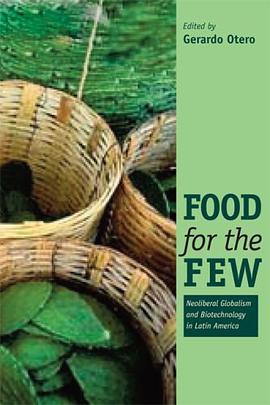

具体描述
Recent decades have seen tremendous changes in Latin America's agricultural sector, resulting from a broad program of liberalization instigated under pressure from the United States, the IMF, and the World Bank. Tariffs have been lifted, agricultural markets have been opened and privatized, land reform policies have been restricted or eliminated, and the perspective has shifted radically toward exportation rather than toward the goal of feeding local citizens. Examining the impact of these transformations, the contributors to "Food for the Few: Neoliberal Globalism and Biotechnology in Latin America" paint a somber portrait, describing local peasant farmers who have been made responsible for protecting impossibly vast areas of biodiversity, or are forced to specialize in one genetically modified crop, or who become low-wage workers within a capitalized farm complex.Using dozens of examples such as these, the deleterious consequences are surveyed from the perspectives of experts in diverse fields, including anthropology, economics, geography, political science, and sociology. From Kathy McAfee's "Exporting Crop Biotechnology: The Myth of Molecular Miracles," to Liz Fitting's "Importing Corn, Exporting Labor: The Neoliberal Corn Regime, GMOs, and the Erosion of Mexican Biodiversity," "Food for the Few" balances disturbing findings with hopeful assessments of emerging grassroots alternatives. Surveying not only the Latin American conditions that led to bankruptcy for countless farmers but also the North's practices, such as the heavy subsidies implemented to protect North American farmers, these essays represent a comprehensive, keenly informed response to a pivotal global crisis.
作者简介
目录信息
读后感
评分
评分
评分
评分
用户评价
我一直对那些能够触及社会深层议题的作品抱有浓厚的兴趣,而《Food for the Few》似乎正是这样一本能够引发思考的书。从它的名字来看,我预感这本书可能不会仅仅停留在美食的层面,而是会借由“食物”这个万能的切入点,去剖析人与人之间的差异,以及这种差异是如何在物质生活,尤其是餐桌上体现出来的。我设想,作者可能会描绘一群生活在社会顶端,或是拥有特殊身份的“少数人”,他们所享用的食物,可能与我们普通大众有着天壤之别。或许是那些经过精心挑选、耗费大量人力物力才能获得的珍贵食材,又或许是那些承载着特殊历史和文化意义的菜肴。更深层次地,我猜测这本书可能会探讨,在看似平等的世界里,为何仍然存在着这样明显的“食物鸿沟”。这种鸿沟不仅仅体现在物质的丰裕程度上,更可能体现在对食物的认知、品味,甚至是对生命价值的理解上。我会期待书中能够出现一些令人耳目一新的观点,能够挑战我固有的思维模式,让我重新审视我们身边的世界。这本书的独特之处,或许就在于它能够将看似日常的“食物”,提升到一种哲学的高度,引发读者对社会结构、资源分配以及个体价值的深刻反思。
评分当我第一次看到《Food for the Few》这个书名时,一种莫名的共鸣感油然而生。我立刻联想到那些在生活中,总有那么一些“少数派”,他们的喜好、他们的选择,往往与主流社会格格不入,却又因为这份独特而散发着迷人的光彩。我推测,这本书很有可能是在描绘这样一群人的故事,而“食物”则是串联起他们故事的重要线索。我设想,书中描绘的“食物”,可能并非我们日常所见的简单餐食,而是那些承载着深刻意义,或是拥有独特制作工艺的佳肴。也许是那些濒临失传的古老菜谱,只有少数人懂得如何烹制;或许是那些用极致的食材,通过精妙的手法制作出的艺术品般的食物,只为那些懂得欣赏的人而存在。我期待书中能够展现出,在不同的社会阶层或文化背景下,人们对待食物的态度和理解是如何产生差异的。这种差异,不仅仅体现在物质的层面,更可能是一种精神上的追求。我希望这本书能够带我走进一个充满智慧和感悟的世界,让我能够从“食物”这个看似微不足道的载体中,窥见更广阔的人生图景,以及那些隐藏在繁华都市背后,不为人知的角落里,少数人的生活哲学。
评分这本书的包装就已经十分吸引人,一种复古而又不失现代感的封面设计,让我立刻被它所吸引。拿到手中,纸张的触感也相当不错,散发着淡淡的书香,仿佛预示着一段不同寻常的阅读体验。我最开始是被它书名所吸引,《Food for the Few》,这个名字本身就充满了故事性,让人不禁联想到一些社会现象,或者隐藏在普通生活下的不为人知的角落。我非常好奇,作者会如何通过“食物”这个载体,去讲述“少数人”的故事。是关于那些拥有独特口味、或是只在特定场合才能品尝到的珍馐?还是说,这“食物”其实是一种隐喻,象征着某些稀缺的资源、机会,甚至是知识?我猜测,这本书的内容可能会深入探讨阶层差异,以及在这种差异下,人们获取和享用“食物”方式的巨大不同。可能涉及到一些昂贵的食材,或是被遗忘的传统烹饪方式,但这一切都是为了衬托出“少数人”的独特之处。我甚至可以想象,这本书的文字会充满画面感,让我仿佛置身于那些神秘的厨房,或是奢华的餐桌旁,去感受那种与众不同的氛围。这种由书名引发的无限想象,正是吸引我购买它的重要原因,我迫不及待地想翻开书页,去探寻作者真正想要传达的信息。
评分这本书的书脊和封底的介绍,给我留下了一种精致而略带神秘的印象。它不像那种直白地告诉你“这是什么”的书,而是用一种含蓄而引人入胜的方式,勾勒出故事的轮廓。我注意到其中提到了一些与“独特”和“选择”相关的词汇,这让我更加确信,这本书绝对不是一本简单的食谱,或者关于某种特定菜肴的介绍。我倾向于认为,《Food for the Few》可能是在讲述一群与众不同的人,他们对食物有着非同寻常的追求,或者说,他们所面临的与食物相关的问题,是普通人难以想象的。或许是关于那些隐藏在社会角落里,却拥有着独特烹饪技艺的厨师,他们所制作的食物,只为一小部分人所享用。又或者,这本书会带我们进入一个充满秘密的社群,在那里,食物不仅仅是满足口腹之欲的工具,更是一种身份的象征,一种情感的寄托,甚至是某种特殊的仪式。我猜想,作者在字里行间会营造出一种引人入胜的氛围,让读者仿佛置身于一个精心构建的“少数人”的世界,去感受他们的生活,他们的喜怒哀乐,以及他们与食物之间千丝万缕的联系。这种对未知世界的好奇心,驱使着我想要去揭开这本书的面纱。
评分我被《Food for the Few》这个书名所带来的反差感深深吸引,它暗示着一种稀缺、一种选择,以及一种与众不同的体验。我好奇地想象着,这本书会讲述怎样的故事。我设想,它可能不是一本面向大众的美食指南,而更像是一本关于“特定人群”的观察笔记,或者是一部关于“特殊品味”的散文集。我猜测,作者会通过细腻的笔触,描绘那些在食物选择上,有着独特追求的“少数人”。他们可能对食材的来源、烹饪的方式、甚至用餐的环境都有着极其严苛的要求。这本书或许会带我们走进那些隐秘的会所,或者那些私人定制的厨房,去一窥那些只为极少数人服务的“饕餮盛宴”。更深层地,我猜想,这种对“食物”的特殊追求,可能折射出这些“少数人”在人生其他方面的独特视角和人生态度。他们对于“好”的定义,对于“价值”的判断,都可能与普通人有着显著的差异。这本书的吸引力在于,它能够引发我们对“稀缺性”和“独特性”的思考,以及探讨在物质极大丰富的同时,为何仍然存在着如此明显的“供需不对称”,而这种不对称,恰恰是“少数人”生存的空间。
评分 评分 评分 评分 评分相关图书
本站所有内容均为互联网搜索引擎提供的公开搜索信息,本站不存储任何数据与内容,任何内容与数据均与本站无关,如有需要请联系相关搜索引擎包括但不限于百度,google,bing,sogou 等
© 2026 book.wenda123.org All Rights Reserved. 图书目录大全 版权所有




















